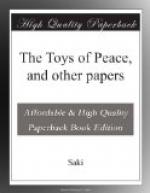Wilfrid Pigeoncote had suddenly become heir to his uncle, Sir Wilfrid Pigeoncote, on the death of his cousin, Major Wilfrid Pigeoncote, who had succumbed to the after-effects of a polo accident. (A Wilfrid Pigeoncote had covered himself with honours in the course of Marlborough’s campaigns, and the name Wilfrid had been a baptismal weakness in the family ever since.) The new heir to the family dignity and estates was a young man of about five-and-twenty, who was known more by reputation than by person to a wide circle of cousins and kinsfolk. And the reputation was an unpleasant one. The numerous other Wilfrids in the family were distinguished one from another chiefly by the names of their residences or professions, as Wilfrid of Hubbledown, and young Wilfrid the Gunner, but this particular scion was known by the ignominious and expressive label of Wilfrid the Snatcher. From his late schooldays onward he had been possessed by an acute and obstinate form of kleptomania; he had the acquisitive instinct of the collector without any of the collector’s discrimination. Anything that was smaller and more portable than a sideboard, and above the value of ninepence, had an irresistible attraction for him, provided that it fulfilled the necessary condition of belonging to some one else. On the rare occasions when he was included in a country-house party, it was usual and almost necessary for his host, or some member of the family, to make a friendly inquisition through his baggage on the eve of his departure, to see if he had packed up “by mistake” any one else’s property. The search usually produced a large and varied yield.
“This is funny,” said Peter Pigeoncote to his wife, some half-hour after their conversation; “here’s a telegram from Wilfrid, saying he’s passing through here in his motor, and would like to stop and pay us his respects. Can stay for the night if it doesn’t inconvenience us. Signed ‘Wilfrid Pigeoncote.’ Must be the Snatcher; none of the others have a motor. I suppose he’s bringing us a present for the silver wedding.”
“Good gracious!” said Mrs. Peter, as a thought struck her; “this is rather an awkward time to have a person with his failing in the house. All those silver presents set out in the drawing-room, and others coming by every post; I hardly know what we’ve got and what are still to come. We can’t lock them all up; he’s sure to want to see them.”
“We must keep a sharp look-out, that’s all,” said Peter reassuringly.
“But these practised kleptomaniacs are so clever,” said his wife, apprehensively, “and it will be so awkward if he suspects that we are watching him.”
Awkwardness was indeed the prevailing note that evening when the passing traveller was being entertained. The talk flitted nervously and hurriedly from one impersonal topic to another. The guest had none of the furtive, half-apologetic air that his cousins had rather expected to find; he was polite, well-assured, and, perhaps, just a little inclined to “put on side”. His hosts, on the other hand, wore an uneasy manner that might have been the hallmark of conscious depravity. In the drawing-room, after dinner, their nervousness and awkwardness increased.




